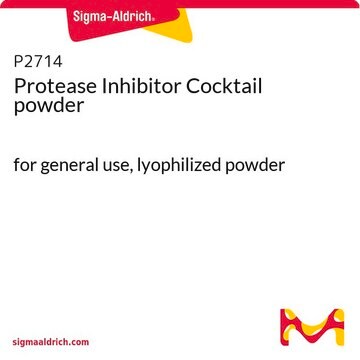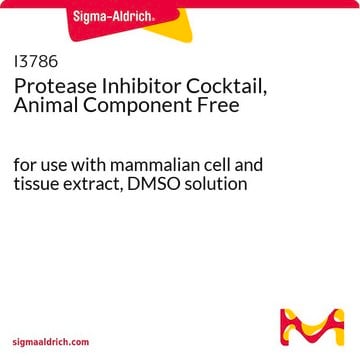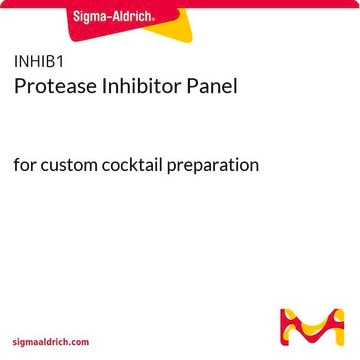20-201
Protease Inhibitor Cocktail I
solid, for the inhibition of serine, cysteine, aspartic and metalloproteases. This small molecule/inhibitor is primarily used for Biochemicals applications.
Synonym(s):
Protease Inhibitor Mix
About This Item
Recommended Products
product name
Protease Inhibitor Cocktail I, The Protease Inhibitor Cocktail I controls the activity of Protease. This small molecule/inhibitor is primarily used for Biochemicals applications.
Quality Level
form
solid
manufacturer/tradename
Upstate®
shipped in
dry ice
Application
Physical form
Storage and Stability
Legal Information
Signal Word
Warning
Hazard Statements
Precautionary Statements
Hazard Classifications
Eye Irrit. 2
Storage Class Code
11 - Combustible Solids
WGK
WGK 3
Certificates of Analysis (COA)
Search for Certificates of Analysis (COA) by entering the products Lot/Batch Number. Lot and Batch Numbers can be found on a product’s label following the words ‘Lot’ or ‘Batch’.
Already Own This Product?
Find documentation for the products that you have recently purchased in the Document Library.
Customers Also Viewed
Articles
The possible causes and potential remedies for challenges encountered in the immunoprecipitation-Western blot technique, which consists of cell lysis, formation of the antibody-antigen (immune) complex, precipitation of the immune complexes, and analysis by Western blotting.
The possible causes and potential remedies for challenges encountered in the immunoprecipitation-Western blot technique, which consists of cell lysis, formation of the antibody-antigen (immune) complex, precipitation of the immune complexes, and analysis by Western blotting.
The possible causes and potential remedies for challenges encountered in the immunoprecipitation-Western blot technique, which consists of cell lysis, formation of the antibody-antigen (immune) complex, precipitation of the immune complexes, and analysis by Western blotting.
The possible causes and potential remedies for challenges encountered in the immunoprecipitation-Western blot technique, which consists of cell lysis, formation of the antibody-antigen (immune) complex, precipitation of the immune complexes, and analysis by Western blotting.
Our team of scientists has experience in all areas of research including Life Science, Material Science, Chemical Synthesis, Chromatography, Analytical and many others.
Contact Technical Service















